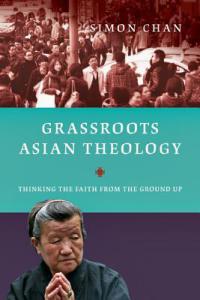
Grassroots Asian Theology: Thinking the Faith from Ground Up by Simon Chan. Downers Grove: InterVarsity Press, 2014.
Summary: In contrast to the growing list of “contextual” Asian theologies out of academic “elitist” settings, Chan explores the Asian theologies implicit in the popular church movements and writers in the Asian context, and particularly the significance of Pentecostal theology.
One of the healthy developments in our post-colonial setting is the increasing number of Majority World theologians contributing theological insight from their particular cultural context. Yet one of the problems is that much of this is written from “elite” perspectives, kind of a top down approach exemplified by Minjung theology, Dalit theology and the writings of people like C.S. Song, Kosuke Koyama, and others. Chan is concerned about the gap between these theologies, often shaped by liberation theology and post-colonial discourse, and the lived theology of the grassroots church in Asia. Early in the book, he cites a Latin American theologian who observed, “Liberation theology opted for the poor and the poor opted for Pentecostalism” (p. 27).
Chan begins with a chapter on methodology. His basic approach is shaped by a “Trinity as family” thesis in terms of considering the Godhead as family, consonant with the importance of family structures in various Asian contexts, the state of humanity in relation to God and how then we understand Christ and salvation, the work of the Holy Spirit, and the nature of the church. For each of these topics, he surveys the work of leading “elitist” theologians, then that of more popular movements and preachers in various Asian contexts, and then includes reflections on these as contributions to a “catholic” theology reflecting contributions of both east and west. This last step, it seems to me is important, because the truth is that in his survey there are multiple and sometimes conflicting grassroots theologies and to stop here would seem to be a descent into cultural relativism. This results, I believe in some important contributions to the discussion of the theological contribution of the Asian context both in engaging various Asian cultural contexts, and for the wider church. Some of these include:
- An understanding of the Trinity as “divine family” provides both challenges and attractions vis a vis other religious beliefs including the personal versus the impersonal, and the model of an ordered family that serves as a grounds for the culturally important human families of Asian cultures.
- An understanding of human sin as bringing dishonor upon the divine family and resulting in shame.
- An understanding of Christ as the one who bears shame and re-orders and reconciles disordered family relationships, between people and God and people with each other, as the one who delivers from illnesses, poverty, and oppressive spirits. Particularly interesting was the understanding of Christ as the “ancestor-mediator” addressing the questions of ancestor veneration that are so central in much of Asian family life.
- A pentecostally informed understanding of the work of the Holy Spirit who unites and empowers the church to face both the world of spirits and human brokenness, bringing, healing, wholeness, and relationship with God.
- Finally, he articulates an idea of the church as a community of “contrast” and yet one that lives in “the communion of the saints” that extends to the dead. In this last, and on the basis of the discussion of Christ as the “ancestor mediator” he allows for the possibility of prayers for or even preaching to the dead that they too may be reconciled to Christ looking toward the day of the marriage feast of the Lamb when that communion will be visible to all and fully realized.
Chan acknowledges that this last conflicts with much post-Reformation theology and yet is consonant with ideas in Catholic and Orthodox circles, and even with writings of people like C.S. Lewis. Here, as in a number of places, Chan does not shy from controversy in raising questions about the possibility of postmortem repentance and salvation, particularly for those who have not heard the message of the gospel, so important in questions about family ancestors, but also for many in the west.
This does raise a question for me about Chan’s methodology. He assesses both elite and grassroots theology against ‘catholic’ articulations of doctrine. Yet on some questions, like this last, the ecumenical creeds are vague, and the understanding of scripture disputed among the different parts of the Church. It is not clear whether for the author the final arbiter is the individual theologian such as Chan, (a post-Reformation view), the grassroots community (a post-modern and post-colonial view) or some form of Magisterium (a Catholic view).
Nevertheless, Chan makes an important contribution in arguing that the grassroots implicit and practiced theology of Asian church communities must be heeded in any discussion of contextual contributions to theological understanding. Any less would not in fact honor “the communion of the saints.”
Editor’s Note: Thank-you to Bob Trube for sharing his review of Grassroots Asian Theology: Thinking the Faith from Ground Up. Hoping to connect with a number of our readers at the Graduate and Faculty Ministry/Emerging Scholars Network focused offerings at the Urbana Student Missions Conference.
Don’t forget
- the Urbana sponsorship applications are due September 16 (FYI: Urbana tag on ESN Blog),
- our growing material on Global Christianity,
- to offer recommendations of material for us to consider/post, and
- to express desire to write for ESN via our Fall survey 🙂
To God be the glory! ~ Thomas B. Grosh IV, Associate Director, Emerging Scholars Network
Bob Trube is a former Associate Director of Faculty Ministry and Director of the Emerging Scholars Network. He blogs on books regularly at bobonbooks.com. He resides in Columbus, Ohio, with Marilyn and enjoys reading, gardening, choral singing, and plein air painting.

Leave a Reply